March 4, 2014, was a good day for Benjamin Netanyahu. The Israeli prime minister woke up in Washington and headed to the city's convention center to address the Policy Conference of the American Israel Public Affairs Committee (Aipac), a pro-Israel lobbying group.
His speech to 10,000-plus delegates was repeatedly interrupted by standing ovations as he warned against the dangers of Iran's nuclear policy, condemned economic boycotts against Israel and painted a picture of what a peaceful Middle East could look like, with Israel and its Arab neighbors collaborating to solve regional problems.
Then he, his wife, Sara, son Yair, several Cabinet ministers, officials and others in his inner circle boarded an El Al Boeing 777 to fly from Andrews Air Force Base to Los Angeles.
That evening, he received more standing ovations from a group of 350 people invited to Paramount Pictures to watch the premiere of "Israel: The Royal Tour," a documentary in which Netanyahu plays tour guide to CBS News travel editor Peter Greenberg. The program began airing on PBS two days later.
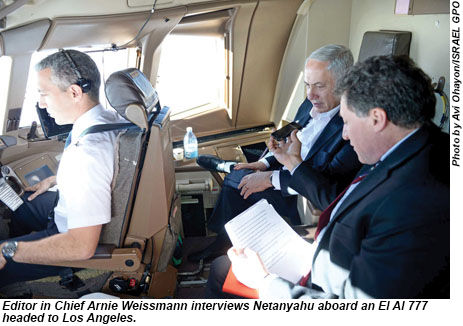 It had been arranged that Travel Weekly Editor in Chief Arnie Weissmann would interview Netanyahu aboard the 777 en route to Los Angeles. Most of the discussion took place in the cockpit to avoid disturbing members of the prime minister's party, who were asleep in the front of the plane.
It had been arranged that Travel Weekly Editor in Chief Arnie Weissmann would interview Netanyahu aboard the 777 en route to Los Angeles. Most of the discussion took place in the cockpit to avoid disturbing members of the prime minister's party, who were asleep in the front of the plane.
Both in the Aipac speech and during the interview, certain recurring themes surfaced, whether he was discussing tourism, peace or the future of Israel. Foremost was Israel's emerging profile as a technology center; Netanyahu linked technology to everything from the continued health of Dead Sea resorts to the cosmopolitan nature of Tel Aviv's nightlife.
And second, Netanyahu repeatedly spoke of Israel tourism increasing its growth rate by high multiples.
(Note: The original transcript has been edited for length, and the chronology has been altered to keep dialogue about specific topics together, though the topic might have recurred in intervals during the course of the conversation.)
Weissmann: Israel, in a very rough neighborhood, had a record year for international arrivals. Do you attribute that to changes in how Israel is marketed?
Netanyahu: It's because it's safe. We've had the safest year in many, many years. My friends in the U.S. ask me, "Should I go to Israel? Is it safe?" And I say, "Once you get past Kennedy Airport, it's fine."
Weissmann: A lot of those arrivals -- 600,000 of 3.6 million -- are from countries of the former Soviet Union. What other source markets do you have your eyes on?
Netanyahu: China, Latin America. I've been to China this year; I go to Latin America in a few months.
Once people realize how extraordinary Israel is, they will come. You can float on the Dead Sea, the lowest point on Earth. And it's very good for your skin!
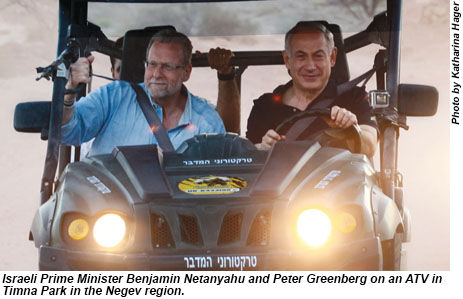 Then you drive for an hour to Tel Aviv, one of the most cosmopolitan cities in the world. It's also one of the coolest cities on Earth, it never stops. It has restaurants, pubs, museums, nightclubs, artists. I always wonder, when do they get up and how do they work? But apparently they do, because it's one of the great centers of high tech in the world right now.
Then you drive for an hour to Tel Aviv, one of the most cosmopolitan cities in the world. It's also one of the coolest cities on Earth, it never stops. It has restaurants, pubs, museums, nightclubs, artists. I always wonder, when do they get up and how do they work? But apparently they do, because it's one of the great centers of high tech in the world right now.
And in Israel, you also see Jewish history. The fortress of Masada is the greatest archaeological site and story. It's about a siege in which Romans built a ramp and overtook it, but the people preferred to take their lives than be sold into slavery. It's a great story of human courage, and it's all there: the siege ramp, the defenses, Herod's amazing palaces. The whole story comes to life.
Israel is so variegated, with natural wonders, extraordinary history and a brilliant future. We should get a lot more than 3 million tourists. I think we should get 10 or 15 million, and that's not as far-fetched as it sounds.
And, it's safe.
Weissmann: On the topic of the Dead Sea, I was surprised to see how dramatically it has shrunk. I understand it's due to the diversion of fresh water from the Jordan River. If the shrinkage continues, will that affect the resorts along the Dead Sea?
Netanyahu: It could. So we're engaging in an innovative program with Jordan to pump water from the Red Sea into the Dead Sea. It's a pilot project, but has great potential economic and ecological benefits. When people see this salt lake of unimaginable colors, they understand why we find it so precious and why we're engaged to save it.
Weissmann: About 2.5 million visitors to Israel last year also visited the West Bank. It appears that tourism is one area where there's a degree of codependency and potential mutual benefit for Israelis and Palestinians. Do you see it as being in Israel's interest to work cooperatively with Palestinian tourism efforts, or do you view them as competitors? Or do political considerations determine the extent of the cooperation?
Netanyahu: I definitely think we both can benefit from it. I don't see them as competitors, because the people who come to us go to them, and people who go to them come to us. By cooperating with the Palestinian Authority, we should be able to appeal to the imagination of many, many millions of people.
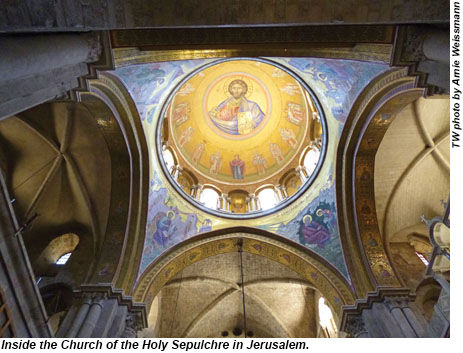 Of the three great sites of Christianity, two are in Israel, one is in the Palestinian areas. The two in Israel are Jerusalem, which is the site of the Church of the Holy Sepulchre where the crucifixion is said to have taken place, and Via Dolorosa. And the other is Nazareth, where Jesus grew up and began his ministry. And then Bethlehem [in the Palestinian Authority] is said to be the place where Jesus was born. All these are in very close proximity and have remarkable historical sites.
Of the three great sites of Christianity, two are in Israel, one is in the Palestinian areas. The two in Israel are Jerusalem, which is the site of the Church of the Holy Sepulchre where the crucifixion is said to have taken place, and Via Dolorosa. And the other is Nazareth, where Jesus grew up and began his ministry. And then Bethlehem [in the Palestinian Authority] is said to be the place where Jesus was born. All these are in very close proximity and have remarkable historical sites.
Also, in the New Testament, there are two references to a synagogue that Jesus visited near the Sea of Galilee. That synagogue stands. That place actually exists. You can go through the door and stand exactly where Jesus stood.
Weissmann: I recently learned about a tour operation started by two women, one a Palestinian Christian, one an Israeli Jew. It's called Breaking Bread Journeys.
Netanyahu: Ha! Breaking Bread. That's better than "Breaking Bad." But if the same number of people who watch "Breaking Bad" come to Israel, we'll be in good shape.
Weissmann: They're getting financial support from the U.S. Agency for International Development and additional support from the Quartet: the U.S., Russia, the United Nations and the European Union. Can you see the government of Israel also providing support for similar cross-border tourism efforts whose explicit goal is to encourage cultural understanding?
Netanyahu: Yes, I've been talking to Tony Blair, the Quartet representative, about it, and we think this could be supported not only by government money but a lot of foundation money.
I think this could be a great business. One of my ideas is to appeal to churches and congregations and give them the ability to build hotels right on the Sea of Galilee, right where what we call "the Jesus boat" was found. We discovered this ancient boat and carbon-dated it, and it's right from the time of Jesus. I'd like to have people fly directly there, spend some time in the Galilee, in Nazareth, come to Jerusalem, go to Bethlehem -- a packaged tour, maybe combined with sites along the Jordan River where John the Baptist baptized his followers. That could be a very good combination with the Palestinian Authority, and it could be one of the great benefits of peace.
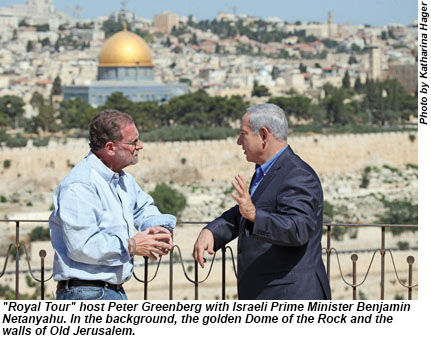 It could be a great, productive effort if we harness not only the Palestinian Authority but also Jordan, with its remarkable sites. Peace could have immense benefits, and one of them could be the doubling or tripling of tourism. Easily.
It could be a great, productive effort if we harness not only the Palestinian Authority but also Jordan, with its remarkable sites. Peace could have immense benefits, and one of them could be the doubling or tripling of tourism. Easily.
Weissmann: In your speech to Aipac earlier today, you touched on boycotts. Clearly, building settlements on the West Bank is a hot-button issue and has led to calls for boycotts, including tourism boycotts. When you discuss whether to approve a settlement, is the potential impact on tourism and its economic benefits considered?
Netanyahu: Israel hasn't built new settlements for over two decades. What we're doing is adding houses to individual communities but not really changing the map, so that's an overblown issue. It's one of those issues that will be resolved in the peace negotiations. In any case, it's a fact that Israel is perhaps the most stable and safe place from North Africa to the Khyber Pass, and it's the only truly democratic place.
And I think Israel will overcome any boycotts easily. Israel is a technological powerhouse. It's just very, very innovative. We have thousands of startups and an environment that's very friendly to business; so many countries and companies, the biggest in the world, are coming to Israel.
And when it comes to tourism, people vote with their feet and with their pocketbooks. There are very few countries with such an evocative story, such an extraordinary past. Where else can you visit the country of Abraham, Isaac and Jacob? Where else can you walk along the same walls King David walked beside, or see the valley where, as a young man, he slew Goliath, or the places that mark our history? It's a great story to tell: the rebirth of the Jewish people.
Weissmann: You have called for economic pressure on Iran. How would you feel about a tourism boycott of Iran?
Netanyahu: There's a difference. Iran is the preeminent terrorist state of our time. People are concerned with Iran's nuclear weapons program, justifiably so. The most important thing is to prevent Iran from actually having [nuclear] weapons, and the international community is focused on it.
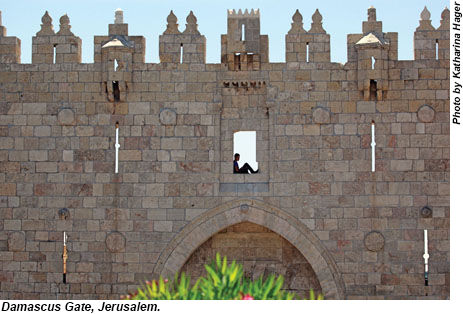 But if you think Iran is such a great place, go ahead and visit. I think it's very depressing to go to a country that is a totalitarian theocracy. Israel is the exact opposite. Israel is modernity. Israel sits astride great history, but we seize the future with enormous energy and vitality. It's not only that it's a free society, but Israelis are very friendly, very open people.
But if you think Iran is such a great place, go ahead and visit. I think it's very depressing to go to a country that is a totalitarian theocracy. Israel is the exact opposite. Israel is modernity. Israel sits astride great history, but we seize the future with enormous energy and vitality. It's not only that it's a free society, but Israelis are very friendly, very open people.
Weissmann: Also in your Aipac speech, you spoke of an almost utopian world where Arab and Israel resources could be combined to move the entire region forward. If you could travel freely, which regional country would you be curious to experience as a tourist?
Netanyahu: I'd be delighted to visit all of them. But certainly one benefit [of peace] would be that we could also fly to Asia over the Arabian Peninsula; at the moment, we go around it, over the Red Sea. But I think the vision I articulated [at Aipac] isn't far-fetched at all. If you look at all that Israel has done over the last 65 years, the technology, we've done remarkable things for ourselves, and with peace we could do it for the region in water, agriculture, milk production, in dealing with the environment, in using energy. Great things are happening.
Weissmann: Tell me a little about the experience of making "Israel: The Royal Tour" with Peter Greenberg.
Netanyahu: First of all, Peter was a lot of fun. He's a great person, and he's very funny.
And it gave me a terrific excuse to go around the country I love so much. Admittedly, we did it after hours and on Fridays so that it wouldn't interfere with my schedule, but it was wonderful visiting the places I know intimately but don't get to go to. You don't actually do a "royal tour" if you're the prime minister, you know? You're sort of landlocked and shuttled between offices.
So this gave me an opportunity to go to the Dead Sea, Eilat, to see King Solomon's mines, to feed dolphins, to go to a nightclub in Tel Aviv with my wife and my son. Where else would I get this opportunity?
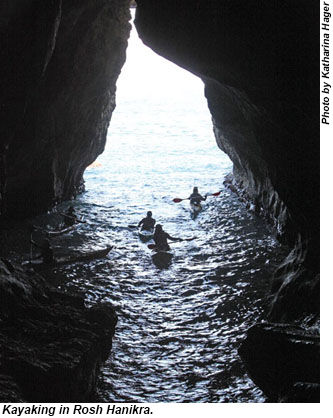 And to visit the Technion and see these remarkable technological advances. A pill that you swallow that photographs your digestive system, and if necessary, squirts medicine where you have an ulcer. That's developed in Israel.
And to visit the Technion and see these remarkable technological advances. A pill that you swallow that photographs your digestive system, and if necessary, squirts medicine where you have an ulcer. That's developed in Israel.
Weissmann: Did you get to any places that you'd never visited before?
Netanyahu: No. I know the country intimately, but there are places I hadn't visited for many years -- you know, the caves in the north of Israel, Rosh Hanikra, where water has made these fantastic shapes, I hadn't been there in a long time.
And in Jerusalem, we went to the place where my grandfather and grandmother are buried, overlooking the old city. It was a very emotional moment for me because, you know, generations of Jews had dreamed that we'd come back to our ancestral homeland and rebuild our life anew. And doing "The Royal Tour" was actually seeing how we realized this ancient dream and what a wonderful, extraordinary country we built. Rebuilt, really.
Email Arnie Weissmann at aweissmann@travelweekly.com and follow him on Twitter.